#watson's general telegraph
Text
The Telegraph
Scores of actresses turn down roles in play critical of JK Rowling’s gender views
Craig Simpson
Thu, June 13, 2024 at 6:49 AM PDT·3 min read
A play that criticises JK Rowling’s views on gender is struggling to cast women with 90 actresses so far rejecting parts.
The stage production, which is set to debut at the Edinburgh Fringe, has already caused outrage over a working title which labelled the gender-critical Harry Potter author a c----.
The production is yet to cast any of the female roles, including that of Rowling herself.
The part of Harry Potter film star Emma Watson has also been repeatedly turned down, and around 90 actresses have refused to take part in the project amid concerns over its critique of Rowling.
The author has become a figure of hate online among some activists, and received death threats after publicly sharing concerns about the encroachment of transgender campaigning on women’s rights.
Actors have been found for male leads, who will portray Harry Potter cast members Rupert Grint and Daniel Radcliffe.
Creative producer Barry Church-Woods told the Telegraph: “This project has met some kind of resistance every step of the way, though I’ve been generally surprised by how difficult it has been for us to recruit the female cast in particular.
“It’s a well-paid gig meeting industry standards and the script is terrific.”
He added: “I think it’s fair to say that a few things are coming into play in casting.”
The play, which was written by queer-identifying Hollywood scriptwriter Joshua Kaplan, tells the story of a fictional intervention staged for Rowling by the stars of the Harry Potter franchise, Watson, Grint and Radcliffe.
The three actors publicly denounced Rowling in 2020 when she first raised concerns about the spread of gender ideology, the belief that gender is unfixed and changes according to how people self-identify.
The work was initially titled TERF C***, with TERF standing for trans-exclusionary radical feminist, a term which has been deployed pejoratively against women who have opposed trans ideology.
It is understood that 30 actresses have turned down the role of Rowling in the play, and 60 have refused the part of Watson, while agencies representing aspiring female stars have been nervous to put their clients forward for the project.
There is some suggestion that the actress may have ideological misgivings about the play, or be concerned about a potential backlash.
It has been suggested by producers that some actresses may not want to appear in a play critiquing Rowling and ruin their chances of appearing in the lucrative new Harry Potter TV series on the Max streaming service.
Rowling is acting as executive producer for the series, and will be involved in key decision-making.
Mr Church-Woods said: “We’ve had agents reluctant to put names forward, I suspect, because they do not want to damage their clients chances of landing roles on the new Potter TV series.”
Writer Mr Kaplan has insisted that his play does not carry a set message, and is more about “relationships and how Rowling’s opinions evolved” rather than a work “interrogating the substance of her opinions”.
TERF plays the Sir Ian McKellen Theatre from August 2 to 25.
But I thought TWAW? Why aren't they looking to hire Transwomen actors to play the women's roles if they truly believe that they are women?
Isn't it funny how they seem to know what a woman is when they want to use them to mock other women?
#radblr#radfem#radfems#feminist#feminism#radfems please interact#gender critical#radical feminist#jk rowling is a queen#jk rowling
547 notes
·
View notes
Text
Telegrams - not the app
Since these are important for both Letters from Watson and Dracula Daily, as well as a chunk of other late Victorian/Edwardian literature, I thought I would share some useful notes on these.
Telegrams were the Victorian form of a direct message sent over the nascent telegraphic network, which was at this point all wires.
Various undersea cables had been laid by the 1890s, allowing messages to be sent across the Atlantic or even to Australia. However, bandwidth was limited.
These messages were by no means instant - you had to wait for them to be passed between operators and that could take a few hours - but they were much faster than post.
They were not cheap - you were charged by the word and there was a minimum charge. Unless you were a diplomat or military officer, messages were generally kept reasonably short. It would be for things like "I'm coming home on the next steamer" or "buy the thousand nunchucks" or "I'd like three rooms at the Golden Krone in Bistritz."
But you could also send someone birthday messages or wedding greetings. Or indeed petition governments.
You would either go to a post office and dictate the message to an employee, or you could complete a form with your message and a stamp to indicate you had pre-paid (books were available), then get your page boy to take it to the post office. Or put it in any letter box.
The telegrams would be delivered to the person's address or could be collected. For example, if you were staying at a hotel, you could get messages sent there and collect them from reception. You will sometimes see characters in old movies asking the receptionist if they have any messages for precisely this reason.
Many of these networks were operated by governments, especially in Europe. This had implications for privacy of course.
To shorten messages and ensure a degree of confidentiality, various commercial code books were available. Common abbreviations would also be used, like FWD, which still exist today.
STOP, COMMA etc. tended to be used by governments and the military rather than civilians.
While the traditional Morse code single key was still very common, various typewriter and other machines were in use by this time that sped up traffic considerably.
281 notes
·
View notes
Text
5 minute read
The first red flag was the “dick pic”. Katie had no idea her 14-year-old son was communicating with strangers in secret on the Mermaids website, until she found several sexually explicit images on his phone.
Her autistic son, who had been teased at school for possibly being gay, had visited the school nurse, who in turn did what so many schools, local authorities and child mental health services across the country now do when presented with a gender-non-conforming child in distress: referred him to Mermaids.
The charity is the country’s best known transgender youth charity. It has basked in the support of celebrities such as Emma Watson and Prince Harry, and won generous grants from the National Lottery and the government.
Unbeknown to Katie, her son had joined the charity’s youth forum, a private online community for 12-19 year-olds who are struggling with gender issues. Parents and carers are not allowed. No proof of ID or age is required, only an email address.
Once signed up, he entered an online world where vulnerable children seeking support with others in similar pain, share their personal details, including phone numbers, email addresses and social media handles, under the apparently approving supervision of Mermaids moderators.
Screenshots seen by The Times also show users openly arranging to move their conversations about experimental drug treatments and medical transition on to even less supervised platforms, such as Discord, with the tacit approval of Mermaids moderators.
It was on Discord, an instant messaging social media platform that was started by gamers and now boasts about 350 million subscribers, that Katie’s son met the strangers who started sending sexual images and asking him to send them photos of himself in sexualised poses in his bedroom in return, which were then found by his mother.
“He felt they were his friends,” said Katie, a teacher. “It was after that I found all the Mermaids emails in his inbox, with the links to all these discussions [on the Mermaids youth forum.]”
The youth forum is promoted on Mermaids’ website as “a wonderful place to find community and allay fears”.
However, critics say it is an “irresponsible ‘Wild West’ free for all’ which allegedly fails the most basic online safety standards.
“Essentially, it is providing a space for children where it’s the blind leading the blind,” said Stephanie Davies-Arai, founder of campaign group Transgender Trend. “These children are not qualified to help other children with emotional and psychological issues. It’s hugely irresponsible.”
Mermaids promotes itself as a leading authority on LGBTQ issues, and is paid to train teachers, police forces, NHS staff and social services on dealing with transgender issues.
This week the Charity Commission confirmed it would be investigating Mermaids’ safeguarding practices, after receiving a number of complaints from parents.
One major red flag was its binder scheme. It emerged in an investigation by The Daily Telegraph earlier this week that the charity is sending potentially dangerous chest binders to children as young as 13 and 14, behind their parents’ backs. These are used by some women and young girls with gender dysphoria to flatten their breasts in a bid to appear more masculine but they carry serious health risks, potentially causing breathing difficulties and damage to healthy breast tissue, ribs and the spine.
Another cause for concern was the youth forum.
Confidential safe spaces can be vital lifelines for children to access support in the charity sector. Childline, for example, allows children to communicate anonymously with each other on message boards, subject to strict controls.
There is a time delay before a child’s post goes live, allowing moderators to screen the content. The house rules set clear parameters for discussion, forbidding any posts that talk, for example about self-harm as a coping method, or suggest that running away might be the right choice. Medical advice is forbidden — “even if something is safe for one person, it might not always be safe for other people” — and no posts are allowed about target-driven goals to change body shape as “it can make people feel competitive and encourage people to diet in unhealthy ways”. Children are not allowed to share any other ways to contact each other off the boards, and, crucially, the message boards are public.
Mermaids conducts its forum very differently.
On its website, Mermaids explains that “we sometimes suggest a young person uses an email address their primary carers have no access to” because some LGBTQ children live in “hostile environments” in which being outed may risk harm or even homelessness.
The charity insists it does not give medical advice. However, much of the discussion revolves around the idea of medical transition as a solution to various problems.
On the forum, which has around 700 members, children share their excitement at the prospect of starting hormone treatment. Introducing themselves, one child said: “I’m 15 and I’ve socially transitioned and I believe I’m getting my first blocker shot on Wednesday. (Fingers crossed!!!)
Mermaids continue to promote puberty blockers as a safe and reversible treatment, despite medical consensus that the long term impact on teenage development remains unknown.
In another post, under the subject heading “Forearm or thigh skin graphs [sic] Phalloplasty”, a young woman who identifies as male asks which part of the body is used to surgically create a penis.
“So I was wondering if anyone knew the difference between taking a skin graph [sic] from your forearm or thigh for phalloplasty? They had heard arm skin was preferred “but since I have permanent self harm scars I don’t think I’ll be able to.”
She is advised by another person in the group: “I really don’t think it will make a difference particularly because it will be 5 - 10 years before you get phallo. (I assume you want T [testosterone] and top surgery before),” adds the respondent, who then recommends some “really good videos on phallo” by a YouTuber.
When an unhappy youngster shares their mobile phone number, Snapchat and Instagram handles, it is left to another user — rather than a moderator — to warn them: “Are you sure it’s a good idea to post your phone number on here? There are over 700 people on this forum.”
In another post, under the topic “lonely”, one young girl posts her full email address and mobile phone number.
Once children sign up to the forum, they receive daily emails, highlighting the discussions taking place under headings such as “advice on unsupportive parents”.
Stephanie Davies-Arai, of the campaign group, Transgender Trend, said: “It’s a bit Lord Of The Flies, isn’t it? You’re letting children create their own little society, where they all support each other in a belief they probably learned online. They don’t have the maturity to recognise the harms of those internet forums.”
Parents expressed particular concern over the moderators’ alleged failure to intervene when users arranged to continue their relationships on other platforms.
In a post dated Jan 2020, a moderator using the name “Izzi J” interjected to advise the youngsters not to draw attention to the Mermaids connection, when they moved their conversation on to the unregulated chat rooms of Discord.
Izzi J wrote: “Great idea for you to have a Discord server together! I have to be a bit of a buzzkill here, you can’t call it Mermaids because it isn’t our server, run by us or affiliated with us. Give it a different name and you’re golden. Have fun :)”
In other posts, the same moderator talks about “the anti trans brigade”.
“Most people I know had no idea about trans issues until I came out and then the good people among them learned and changed how they viewed things. Some people are too lazy and bitter to change and that’s unfortunate.”
Having complained to the Charity Commission in 2020, Katie, not her real name, welcomed the watchdog’s decision to investigate further.
“I am cautiously optimistic that this time the Charity Commission will recognise unequivocally the harm being done to very vulnerable children,” she said.
Another parent, whose child was also referred to Mermaids, said: “Mermaids sees itself as the ‘hero’ or ‘rescuer’ of children, from ‘unaccepting’ parents. Anything that sidelines parents is a red flag.”
He said he was horrified to see the moderator’s response to Discord: “Discord is absolutely full of really grim self-harming and eating disorder servers [chat rooms], so just having vulnerable kids with body issues on discord is potentially a major risk.
“In contrast, Mermaids basically said, ‘what a great idea, off you go into this internet wild west, just you can’t use our name’. There was no concern for these young people’s welfare, they actually endorsed the idea of setting up a private server whose membership and rules would be completely hidden.”
The Times asked Mermaids to clarify the ages, training and background of the moderators who are responsible for supervising the forum, but the charity refused to respond.
In a statement, Mermaids said it was the victim of a “smear campaign.”
It said: “We’re in the midst of a targeted, cynical attack. Security of our platforms and safeguarding of young people is of the utmost importance to us and we continue to regularly review our processes and procedures to make sure our forums remain safe and secure. There are several layers of moderation checks before anyone can gain access to the forum, and anyone found to have fraudulently gained access to our platforms will be reported to the police immediately as a safeguarding concern.
“All of our moderators receive comprehensive training, including safeguarding training, and everyone using the forum has to comply with a strict code of conduct, which prohibits the sharing of personal information, including online identities.”
Mermaids emerged as a support group for young people receiving treatment at the NHS gender identity clinic based at the Tavistock and Portman NHS Foundation. Trust, which has since been disbanded on the recommendation of an independent review.
Whistleblowers said they were alarmed by the charity’s alleged influence over the clinic’s leadership team, with some clinicians concerned that Mermaids was schooling young people on what to say in the consultation room, in order to access hormone therapies quicker.
Mermaids insists it does not encourage one particular treatment over another.
372 notes
·
View notes
Text
Wait, wait, there's one last Letters from Watson for A Study in Scarlet, and it has the ANSWER to my question from the last one.
Having left the house, I proceeded to do what Gregson had neglected. I telegraphed to the head of the police at Cleveland, limiting my enquiry to the circumstances connected with the marriage of Enoch Drebber. The answer was conclusive. It told me that Drebber had already applied for the protection of the law against an old rival in love, named Jefferson Hope, and that this same Hope was at present in Europe
So Drebber not only asked for police protection, but the police were motivated to trace Hope to Europe. Drebber must surely have been very rich to get this level of service for his tax dollars.
The rest of Holmes' explanation is such an interesting reveal of how important contextual knowledge is. It's obvious enough when he's first investigating that the carriage wheel tracks mean something, but as a twenty-first century digital gal, I could never have filled in the blanks on the difference in carriage wheel gauge.
My 13 days of Duolingo Latin (it's a very short course) gave me a working knowledge of drunken parrots in the marketplace, but nothing sufficient to the final quote. (I cannot decide if I envy or sympathize with the generations of English public school boys who had to learn Latin and Greek. The skill seems handy -- and characters certainly quote at one another madly in novels -- but it's never so handy in real life that I do anything about it. Everything gets easier by the Golden Age of Mysteries, when the aphorisms are as likely to be in French.)
People hiss at me, but I applaud myself
At home, I contemplate the money in the box.
20 notes
·
View notes
Text
I saw this list when it first went up a while ago, thought it was incredibly fucking weird, meant to make a post about that, but then got distracted and forgot to do so. I was reminded of it yesterday, when Mark Watson referenced it in his show, because of course he did. Of course it took Mark Watson under five minutes to bring up 1) the fact that the was on a list of the 50 greatest comedians of the 21st Century, and 2) the fact that he was only number 50 on the list and he's worried about all the people ranked ahead of him. And, he said, three of the people above him are shit.
To be honest, that's generous. I mean, I realize he was sort of joking, but still, there are definitely more than three shit comedians on that list. And just overall, it's fucking weird. These lists are always weird, you can't rank anything as subjective as comedy, and they never perfectly reflect who's actually most talented at the craft. But still, even by the standards of weird bullshit lists, this one is really weird.
First of all, it’s weird that they called it a list of the greatest stand-up comedians of the 21st Century, instead of specifying British comedians, or comedians who've done most of their work in Britain, given that that's almost the entire list. I hate things that are America-centric, and even I have to admit that there are definitely more Americans than that among the 50 funniest comedians worldwide of the last 23 years.
Having said that, Inside was brilliant, a lot of his older songs are also very funny, but Bo Burham is not the funniest comedian in the world. Tim Key is very funny, but... third best? In the entire world? I fucking love Mae Martin, but... are there really only five people in the whole entire world who are funnier than them? They're above Billy Connolly and Eddie Izzard?
Nina Conti at 13 is just a massive insult to #14-50 and everyone not on the list. I honestly feel like that must just be the Telegraph writer fucking with people. I'm funnier than Nina Conti. My only thought is you could sort of blame it on them being a Tory paper - ventriloquism is fairly old school, maybe they like that? But Frankie Boyle's higher than her. Nish Kumar's on the list. This specific list isn't that pro-Tory.
I find Lara Ricote very funny, she won the Edinburgh Newcomer award last year and while I haven't heard the show I'm guessing it was deserved based on other stuff I've heard her do. But there's a massive leap between "best new comedian at the Edinburgh Fringe Festival in 2022" and "30th best comedian in the world". Also, if they're trying to include 2022 Edinburgh winners to show that the new comedians are also good, it's weird that they left off Sam Campbell, who won the actual award (the thing that is no longer Perrier). He's funnier than quite a few people on that list.
Also, no Jimmy Carr. I don't think Jimmy Carr is among the 50 funniest comedians in the world. But he is objectively a big deal. Michael McIntyre is on the list, and I refuse to believe the person who wrote this list genuinely thinks he’s the 27th funniest person in the whole world. They included him because you have to, you can’t ignore a guy that big. You’d think Jimmy Carr would be in the same boat.
On the subject of people I might not put on the list, but should probably be included for similar reasons, not a single Russell. Not a single one of those Russells they have now (on that subject, actually, I do find putting Stewart Lee second kind of funny). Lee Mack's not on the list either, he's played arenas.
Ed Byrne? Not even on the list? I'm not saying he's the funniest comedian in the world and would belong on a perfectly done list, but this means they're saying every person on this list is funnier than Ed Byrne. Mickey Flannigan is not funnier than Ed Byrne.
No John Oliver, host of the biggest satire show in America. I mean, there are giant swathes of extremely successful Americans being left out, but you'd think they might include that one since he's also British. Wrote that paragraph, then remembered it's specifically a list of stand-ups. Leaving the paragraph in with the strikethrough because I think John Oliver's stand-up is extremely underrated and he's very, very good at it and would deserve be included for that. But it's not what he's well known for now.
Kitson is right to make jokes about people waxing poetic about him being the greatest stand-up of his generation. I get that he's tired of hearing that and that it's not that simple. But putting him at 18th, below Nina Conti and Adam Riches, seems like going too far the other way.
What a weird fucking list. I guess that's the point of these things, maybe being intentionally weird to make people talk about it. I guess technically I've just linked to a Tory paper from my blog, which is not a great idea. In my defence, I am not driving a large amount of traffic to it. I'd feel a greater responsibility to avoid that if my blog weren't tiny. And none of this matters. It's just really weird.
11 notes
·
View notes
Text
LPGA Tour star Charley Hull wishes for Women's Open Championship to return to Trump course
New Post has been published on https://sa7ab.info/2024/08/16/lpga-tour-star-charley-hull-wishes-for-womens-open-championship-to-return-to-trump-course/
LPGA Tour star Charley Hull wishes for Women's Open Championship to return to Trump course


Charley Hull has gained a tremendous amount of popularity on the LPGA Tour over the last few months as pictures of her smoking on the golf course and while signing autographs have gone viral.The British golfer, who has multiple second-place finishes in some of the majors that occur during the year, expressed interest in the Women’s Open Championship returning to Turnberry despite it being owned by former President Trump.CLICK HERE FOR MORE SPORTS COVERAGE ON FOXNEWS.COMThe Trump Organization bought the golf course in 2014, but outgoing Royal & Ancient (R&A) Chief Executive Martin Slumbers has made it clear that the tournament will not be played there again so long as the company owns it. The R&A’s decision came after the Jan. 6 Capitol riot.She agreed “100%” that the policy should be changed.”I thought it was a great golf course, great fun,” she said while preparing for the Scottish Open, via The Telegraph. “I love being out there, and the views are brilliant.””Like honestly, it’s one of the best golf courses in the world. It would be a shame to not be on there,” she added.SCOTTIE SCHEFFLER RIPS ‘SILLY’ PGA TOUR PLAYOFF FORMAT: ‘IT IS WHAT IT IS’The incoming R&A head, Mark Darbon, has not said one way or the other how he feels about events returning to the South Ayrshire, Scotland, course. The course’s general manager, Nic Oldham, suggested the R&A consider returning to the course on the 50th anniversary of the so-called “Duel in the Sun” in 2027 – named after Jack Nicklaus and Tom Watson’s battle in 1977.The Women’s Open Championship was held at Turnberry in 2002 and 2015.Australian Karrie Webb won the event in 2002, and South Korean Inbee Park won in 2015.This year’s Women’s Open Championship begins on Aug. 22 at the Old Course in St. Andrews, Scotland.Follow Fox News Digital’s sports coverage on X, and subscribe to the Fox News Sports Huddle newsletter.
0 notes
Text

29/03/2024 - Leaving Ramsgate and going to celebrate Emily’s birthday at Watson’s General Telegraph in Forrest Hill. We had a lovely time in the pub garden. The sun was shining and it was really nice being introduced by Emily primarily as a friend from book club and secondly as a school friend of Joe. I met baby Arlo just before Kieran and Holly left. We enjoyed the Guinness cake Joe made. It got a bit chilly but we managed to grab a spot by the heaters and talked book club with some of Emily’s friends (who do it and a themed dining experience which I loved the sound of!). I ended the evening with the success of making my connecting bus at Crystal Palace by about 30 seconds. A great night!
0 notes
Text
Bring your pooch to the Fun Dog Event in Peckham at the Watson’s General Telegraph, Sun 2nd June 2024
New Post has been published on https://petnews2day.com/news/pet-news/dog-news/bring-your-pooch-to-the-fun-dog-event-in-peckham-at-the-watsons-general-telegraph-sun-2nd-june-2024/?utm_source=TR&utm_medium=Tumblr+%230&utm_campaign=social
Bring your pooch to the Fun Dog Event in Peckham at the Watson’s General Telegraph, Sun 2nd June 2024
A new Fun Dog Event in Peckham set to take place on Sunday 2nd June at the Watson’s General Telegraph, promising to be an “unforgettable experience for both dogs and their owners.” The organisers told Brixton Buzz more about the event: Spanning across 2.5 hours, the Fun Dog Events will feature a range of activities […]
See full article at https://petnews2day.com/news/pet-news/dog-news/bring-your-pooch-to-the-fun-dog-event-in-peckham-at-the-watsons-general-telegraph-sun-2nd-june-2024/?utm_source=TR&utm_medium=Tumblr+%230&utm_campaign=social
#DogNews
0 notes
Text
Another turn of the knife for Meghan re: Dior... by u/Chasmosaur
Another turn of the knife for Meghan, re: Dior...
So between the statement that opened the Telegraph article yesterday about the connection of the BRF and Dior...A source at the French fashion house has denied rumours of an imminent deal, telling The Telegraph that reports crowning a new “Duchess of Dior” have left the team in Paris "nonplussed as to how the story came about"....and [the royal-covering/tennis-loving Instagrammer who prefers to not be directly named] stating in her IG stories that one of her "highly reliable" sources (which do seem to be generally reliable) that...Meghan embodies everything Delphine (Arnault, CEO of Dior) detests in a person. Delphine's aesthetic is more in line with Kate rather than Meghan....all I can think is that it had to hurt seeing these images on Emma Watson's Instagram two days ago.Screenshot of Emma Watson's Instagram account, showing images of her modeling for Prada Beauty.Because she partnered with Prada Beauty to model these looks on her Instagram. (Why her IG instead of theirs? She has waaaaaay more followers and she tagged them - probably worked better that way, and I'm sure she also has enough clout to control the images in the way she chooses.) We all know how much Meghan aspired to *be* Emma Watson, as far as her fame and placement as a famed women's rights activist, so to see these images so casually thrown up and getting positive press coverage without much effort? Had to hurt. (I mean, I'm "meh" on the clothes but the fact she has the kind of power she still has to promote brands, even though she hasn't acted in several years and has apparently just been quietly living her best life.)While Meghan didn't wear Prada clothes often - it looks like she wore them in 2018 in one of her earlier engagements [June 26, 2018, Vogue, "Meghan, Duchess of Sussex, Wears Prada to the Queen’s Young Leaders Awards Ceremony" Archive Link | Original Link ] - she has been seen carrying several different Prada bags over the years, so clearly, it's a brand she likes.[April 25, 2023, Daily Express, "Meghan wore a Prada bag from her £10,000 collection to watch the Lakers" Archive Link | Oriignal Link]Of course, she wouldn't have been allowed to actually rep Prada like this as a working royal, but I bet she thought houses would be lining up to offer her deals like these post-Megxit. Guess Hermione was always going to be the safer option with her more wholesome reputation, especially with her 72 million Instagram followers, still about 7 times what Sussex Royal had, and about 3x what the Wales' have...https://ift.tt/pPNCcdm
post link: https://ift.tt/T1KXnWx
author: Chasmosaur
submitted: June 20, 2023 at 05:38PM via SaintMeghanMarkle on Reddit
#SaintMeghanMarkle#harry and meghan#meghan markle#prince harry#sussexes#markled#archewell#megxit#duke and duchess of sussex#duchess of sussex#duke of sussex#harry and meghan smollett#walmart wallis#harkles#megain#spare by prince harry#Chasmosaur
0 notes
Photo

GOOD EVENING LISTING - MAY 2017
CABLE CAFE
Tuesday Nights / 8pm / 8 Brixton Road / SW9 6BU
02.05.17
ROBIN KATZ
Hot Swing
09.05.17
PROFOUNDLY BLUE / ADRIAN COX
Early Swing - In Celebration of Edmond Hall
16.05.17
AMANAÉ SUGANAMI
Heavy Jazz Music
23.05.17
GIACOMO SMITH
Happening Jazz Music
30.05.17
BALDERAMA
Choro / Afro Brazilian
WATSON’S GENERAL TELEGRAPH
Thursday Nights / 8:30pm / 108 Forest Hill Road / SE22 0RS
04.05.17
FRASER SMITH / HERE’S TO LESTER
Happening Swing / Salute to Lester Young
11.05.17
GROOVE REVIVAL
Funk / Soul / Groove
18.05.17
CARAVELA
Afro Brazilian Samba
25.05.17
MARCUS BONFANTI / DELTA TRIO
Hot Shaking Blues
THE ROYAL ALBERT
Sunday Nights / 8pm / 460 New Cross Road / SE14 6TJ
07.05.17
PALACE AVENUE DIXIELAND BAND
Dixieland Early Jazz & Blues
14.05.17
LUDI’S EYE
New Soul / Jazz Music
21.05.17
KING LOMO
Afrobeat Special
28.05.17
PATRICK BOYLE QUARTET
Jazz - In Celebration of Andrew Hill
#jazz#live music#london#live jazz#south london jazz#good evening#deptford#new music#soul#funk#cable cafe#oval#the royal albert#watson's general telegraph#WGT#tom sankey#good evening arts#south east london jazz#free live music
5 notes
·
View notes
Text
Rosie Watson
I don’t see much talk about Rosie, which is understandable since she has so little screen time. However, a child is a pretty important part of anyone’s life. And I’m in a child psychology class right now, so this sort of stuff is on my mind. I often see her appear in fanfiction, usually inaccurately, which is understandable because writing children is hard. This post is going to talk about her development at the end of the show (about 18 months old), what her development would be like at 2 years old (a common age for her in fanfiction), and how Mary’s death might have affected her.
Physical Development
By 18 months old, the physical development of most babies is pretty well developed. They’re almost definitely going to be walking by this time, maybe still a little unsteadily, but most can get around pretty well without much assistance at 18 months. By two years old, most children can climb stairs, run, and jump. Other than growing bigger, their physical development is starting to come to a close. Fine motor skills are still developing at this age; gross motor skills are going to be more well developed. A common test used is stacking blocks. At 18 months, they can generally only stack about 3, but by 2 years, babies can usually stack 5 blocks. Their peripheral and color vision is basically completely developed by 2 years, and their eyes, unless there is something wrong with them, will probably be close to 20/20 vision. They have well developed depth perception and perceptual constancy (the idea that an object viewed from a different distance or a different angle is still the same object). By 18 months, their hearing is well developed, and babies of this age can locate the sources of sounds just as well as adults can.
Cognitive Development
Jean Piaget came up with 6 stages for cognitive development in babies. By 18 months, Rosie would be in either stage 5 (12-18 months) or stage 6 (18-24 months). By this age, Rosie would be quite inquisitive about the world. Babies at this age are described as ‘miniature scientists’: they are exploring and trying to figure out how things work, often getting into things they shouldn’t. And since they can move around pretty well by this age, they’re able to get into a lot of things. They will be engaging in trial and error behaviors in order to accomplish something, though at 18, the baby might be able to start mentally representing some objects and able to manipulate them in their head and figure it out that way. The example Piaget gives is an experiment he did on his own kids. At (I think) 18 months, he gave his daughter a stick that she wanted to pull into her crib. She was able to get it into her crib only by repeated trial and error of repeatedly turning the stick until it was able to fit through the bars. He repeated this experiment with a different kid when they were about 24 months old, and they were able to sit there and think about it for a moment before turning the stick and pulling it into the crib because they were able to mentally manipulate the stick. Object permanence is fully established around 12 months, so Rosie at this age would fully grasp it and go after objects that have left her view or been hidden. Deferred imitation (the ability to repeat an observed action after a waiting period) is also well established by 12 months - children are able to repeat actions seen 4 weeks prior. So it would be easy for Rosie to repeat the actions of others at 18 months, definitely by 2 years. This is because memory starts solidifying around 12 months. Toddlers 1-3 years old require 12-14 hours of sleep each day.
Language
I think this is the biggest mistake I see when it comes to writing really young children. Your 2 year old will not be speaking complete sentences. At 18 months, babies only have a vocabulary of about 50 words (though, they can understand far more words than this - probably twice as many words). Between 18 and 22 months, babies have a vocabulary explosion, going from 50 words to about 300. About 75% of the words gained during this time are nouns. What is common at this age is overextension, which is use of words in situations where meaning is extended. This usually happens with function or form. For example, if a baby is shown a small dog and told that is a ‘doggie’ and then shown a cow and told that is a ‘cow’, they child might think anything bigger than the small dog is a cow, even if its actually a dog. So medium to large dogs, sheep, horses, moose, and cows might all get called cows. By extension, anything about the size of the dog, or maybe even smaller, might get called ‘doggie’. Or, maybe the baby has a toy train that it calls a ‘choo-choo’. The baby might end up calling anything with wheels a ‘choo-coo’. At 18-24 months, babies will be using 2 word sentences. However, they do seem to understand syntax pretty well at this age - if they want you to sit in a chair, they will tell you ‘sit chair’, not ‘chair sit’. At this age, they will be using Telegraphic Speech, which are brief expressions that contain the meaning of the sentence but only essential words are used. Adults use this in their everyday life, such as if we text someone ‘home Tuesday’ instead of ‘I will be home on Tuesday’.
If you want to go the route of showing Rosie as some sort of genius baby (or any baby of this age, for that matter), then you might have a baby using 3 word sentences with a vocabulary of 500 words. That would be a very smart baby. However, it’s almost impossible to tell how smart someone will be at this age. Baby’s brains are still developing, and even the smartest babies will have an upper limit on what they are capable of at this age. Most IQ tests can’t really start accurately predicting future intelligence until about 5 or 6. Even the tests that have been designed for babies 2 and younger are really only useful for telling if there’s some sort of cognitive impairment, not if the baby is exceptionally smart for its age. Even the ones that excel at the tests at that age might end up with only average intelligence. If you want Rosie to be a genius, it likely won’t really start showing until she is a little older.
Mary’s Death
Mary dies sometime between Rosie being about 6 months (when she throws the rattle at Sherlock) and 18 months (the end of TFP). We’ll just say 12 months for easy numbers. By this age, Rosie would have developed very strong attachments to her caregivers. Obviously John and Mary are her caregivers, but the scene where Rosie throws the rattle at Sherlock shows that Rosie has formed a strong attachment with Sherlock; 6 months is about the age where fear of strangers begins, and Rosie shows absolutely no discomfort with Sherlock, so he’s been around enough for the previous months to have a strong attachment with him. When Molly tells Sherlock that John doesn’t want to see him anymore at the end of T6T, we’re going to say that Rosie is about 12 months. This is about the time when fear of strangers starts declining, but if Rosie wasn’t pretty comfortable with Molly, she would be fussy at being taken away from her father, so it’s a pretty safe bet that Molly has also been pretty involved with taking care of Rosie. So, that’s 4 primary caregivers total.
Some might think that, because Rosie is so young, Mary’s death wouldn’t affect her. And Rosie isn’t likely to remember Mary or that she died. However, babies are utterly dependent on those that take care of them. Consequently, they form very strong attachments to those that take care of them. As anyone who has been around a baby can tell you, they get upset when the person that takes care of them disappears and isn’t around to offer them safety and comfort. By 12, Rosie would have formed a very strong attachment with Mary; even with her other caregivers being around, she still would have noticed Mary’s absence and been affected by it. However, her other caregivers weren’t around. John tells Sherlock that he doesn’t want Sherlock around any more, and then Sherlock goes “off his tits” with drugs for a while. John is having to deal with his wife being dead and the anger he feels towards his friend over that. It’s shown that he’s not doing too well. He’s probably still Rosie’s primary caregiver, but he almost definitely wouldn’t be as involved as he was simply because he’s so emotionally distraught. Meaning that the person who was probably least involved with Rosie prior to Mary’s death (Molly) might have ended up becoming the main caregiver for Rosie for a little while there. She went from 4 to 1 and a half caregivers, more or less. And that would definitely have affected her.
The most obvious way would be in her attachment style. Babies form different attachments to their caregivers, partially dependent on the baby’s own temperament, but usually dependent a lot more on the kind of care they receive. Most babies have secure attachment. Securely attached babies will show mild distress at a caregiver’s departure and will want to interact with the caregiver upon their return. However, they are easily comforted by the caregiver and go back to being happy and content pretty soon after being comforted. They use their caregiver as a secure base to explore the world around them. As long as the caregiver is close by, and giving positive signals as the baby is exploring if the baby becomes uncertain, they will remain content and explore just about everything they can. Securely attached babies are happier and more sociable with strangers, more cooperative with parents, get along better with peers, are better at problem solving, and having higher attention spans and lower impulsive behaviors. Contrast that with insecure attachment. There are actually 3 different types of insecure attachments, but I’m not going to go into them because this post is long enough as it is, and the individual types isn’t really important. There are some consistencies. Insecurely attached babies will be more emotionally distressed and less easily comforted by caregiver’s departure. They may initially show confusion or be dazed and disoriented with the caregiver first leaves. They may show contradictory behavior when the caregiver returns, alternating between pulling the caregiver close and pushing them away (though, there is one form of insecure attachment where the baby basically just ... doesn’t care about the caregiver. They show the least distress out of all babies when the caregiver leaves and basically ignores them when the caregiver returns).
Rosie would most likely start out as a securely attached baby. She is surrounded by a lot of people that love her and engage with her and take very good care of her. Sherlock would absolutely encourage exploration and curiosity within Rosie. however, attachment styles can change, depending on the caregiving received. I think it likely that, after the events of T6T, her attachment style would change from secure to insecure. The good news is, that also means it can change back, from insecure to secure. Even though we see Sherlock and John interacting with her will at the end of TFP, she would likely still be insecurely attached. It takes time for anyone to get over that sort of thing. If you are writing her at 18-20 months, it would be completely believable to write her as being a bit of a ‘problem baby’, with all the issues that come from insecure attachment. However, by 2 years, she will likely have gone back to a secure attachment style, likely with no lasting consequences of what happened during season 4. Babies display a wonderful ability to bounce back from all sorts of harsh conditions they go through at a young age, showing almost no problems later in life as long as they are given the chance to have a better situation and improve.
I hope this helps anyone looking to write about Rosie or any babies about 18 to 24 months of age.
#rosie#rosie watson#sherlock#sherlock holmes#bbc#bbc sherlock#sherlock bbc#john watson#mary watson#mary morstan#writing advice#fanfiction help#babies#t6t#the six thatchers#tfp#the final problem
148 notes
·
View notes
Text
The Hound of the Baskervilles: Three Broken Threads
Hat tip to @myemuisemo for another excellent post that covers much of what I was planning together:
Data protection was not really a thing back in 1889. However, paper hotel registers would be something filled in by the front desk staff, not the guest. They would contain details of extra charges incurred as well, all stuff generally done by computer, but you can still buy paper copies today. Particularly for the Indian market, where less than half the population have Internet access. These registers are generally mandatory and in some countries, the data will still be passed to the police when it concerns newly arrived foreigners. That's why they ask for your passport.
Newcastle upon Tyne, the one people generally talk about as opposed to Newcastle-under-Lyme in Staffordshire, was at the centre of a major coal mining area in North-East England, the Durham and Northumberland coalfields being in close proximity. The industry was still employing children - boys as young as 12 could work in mines - and was still a pretty dangerous, not to mention unhealthy industry.
The British economy was heavily reliant on coal, especially the newly built electric power stations. While the railways had a big coal trade for internal transport for domestic purposes, boats also played a big role, either going via canal or down the East Coast of Great Britain to the London Docks. This route would become vulnerable to German attack in the World Wars, particularly in the second war from fast torpedo boats known to the British as "E-boats"; the East Coast convoys are a lesser-known part of the naval war, with Patrick Troughton having served with Coastal Force Command.
The Mayor of Gloucester, like most civic mayors in England, is the chair of the council, elected to a one-year term by their fellow councillors. The current holder is Conservative councillor Lorraine Campbell. It's a mostly ceremonial role involving going to various events while wearing a red cloak and a big hat:
Gloucester's Deputy Mayor is called the Sheriff of Gloucester. There is still a Sheriff of Nottingham, by the way.
The Anglophone Canadian accent was historically noticeably different to an American one and of course had its own varieties. They've gotten closer over the decades, especially due to television.
Sir Henry would have limited luggage space on the ship over, so three pairs of boots would be reasonable. He'd have to ship over anything else at further cost, so it could be cheaper to buy new in London.
Deliveries of telegrams that weren't in the immediate area of the office cost extra. Bradshaw's Guide for Tourists in Great Britain and Ireland would state the nearest telegraph office for a town, as the 1866 edition demonstrates:
Sir Charles' estate was worth around £80m in today's money, but that would not even get him onto The Sunday Times Rich List, which starts at £350m (Sir Lewis Hamilton, i.e. the F1 driver). It tops out with Gopichand Hinduja and his family at an estimated £37.2 billion, whose conglomerate is many focussed on India, but also are the biggest shareholders in US chemical company Quaker Houghton.
Westmoreland was a historical county in Northern England; it was absorbed into Cumbria in 1974, but its area became part of the Westmoreland and Furness unitary authority in 2023.
"Entailed" means that Sir Charles has stipulated in a legal document that the Baskerville estate would have to pass to Sir Henry's heir intact. This was a feudal era practice that has now been abolished in most jurisdictions, with limited remaining use in England and Wales. Simply put Sir Henry is not allowed to sell the house or the land, even part of it. He can do what he likes with the cash and probably the chattels, the movable property like the candlesticks and the toasting forks.
This page covers it in relation to the works of Jane Austen with relevant spoilers:
Borough is another name for the area of Southwark. It got a Tube station in 1890, when the City and South London Railway opened, now the Bank branch of the Northern line. It also is famous for Borough Market, then a wholesale food market under cover of buildings from the 1850s. Today it is a retail market for specialty food; kind of like a farmers' market.
In 1888, the 10:30 from Paddington would get to Exeter at 15:35, a journey of five hours. @myemuisemo provides route maps. I would add at this point, GWR services to SW England went via Bristol, adding a lot of time to the journey, while the LSWR route from Waterloo was a lot more direct. Wags dubbed the former "the Great Way Round". The construction of two cut-off lines allowed the GWR to go via Westbury and Castle Cary.
I will cover the modern day condition of the route in my Chapter 6 post.
The GWR still had some broad-gauge track at 2,140 mm(7 ft 1⁄4 in) left that Brunel had favoured, but this would be finally eliminated in 1892.
Finally, Holmes is referencing the sport of fencing when he learns the cabbie has been given his name. The foil is the lightest of the three swords used in competitive fencing, such as the Olympics.
In an age before electronic fencing equipment, point scoring relied on the eyesight of the umpire... and the honesty of the competitions.
I was in my fencing club at university. I can't say I was that great. I preferred the epee, which doesn't have the priority rules...
12 notes
·
View notes
Text
Marleybonean Dog Breeds
Inspired by this post by @buccaneers-babey
back to your regularly scheduled lore posting
Certain dog breeds seem to be associated with specific occupations/genders in Marleybone. I looked through many of the Dog NPCs in Marleybone (both W101 and P101) and Celestia, and I was definitely able to make some connections. Also, I had no idea that KI had models for twenty-four different breeds (at least). I would have guessed, like, five.

Borzoi
Associated with the Navy. Examples:
Lt. Springer (companion--P101)
Admiral Nelson (Barkeley Square--P101)
Beagle
Seem to range anywhere from wealthy businessmen to poor orphans.
Oliver Twist (Barkeley Square--P101)
Professor Challenger (Barkeley Square--P101)
Cratchit (Isle of Dogs--P101)
Gerry Ramsden (Isle of Dogs--P101)
Bulldog
Pretty variable, but many seem to be in the military.
Bulldog Sergeant Major (Barkingham Palace)
Watson (Scotland Yard Roof) [Of note is the fact that Watson from the original stories worked as a doctor for the British Army.]
Ms. Conrail (Hyde Park)
Reed Treever (Regent’s Square)
Sally Newflower (Royal Museum)
Deirdre Parker (Celestia Base Camp)
Admiral Doggett (Barkeley Square--P101)
Colonel Smeagle (Barkeley Square--P101)
Judge Burble (The Glass House--P101)
Bloodhound
We only have one example, but this breed could easily be associated with detective work.
Sherlock Bones (Digmoore Station)
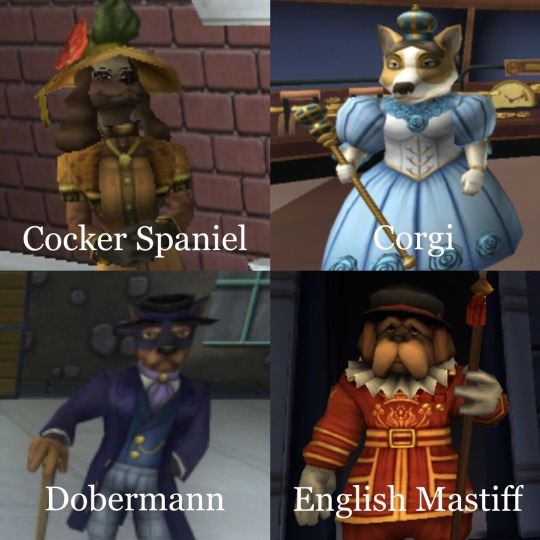
Cocker Spaniel
Commoner women.
Tracy Castleton (Digmoore Station)
Amy Brooks (Knight’s Court)
Corgi
This breed seems to be associated with the royal family... and with poor maids in gross taverns?? Maybe members of the Marleybonean royal family--never mind.
Queen (Barkingham Palace)
Nancy (Isle of Dogs’ Sewers--P101)
Dobermann
This seems to be the breed of (generally) high-society men.
Arthur Wethersfield (Ravenwood)
The Maestro (Telegraph Box)
Mayor Pimsbury (Digmoore Station)
Mr. Rowley (Hyde Park)
Bill Tanner (Knight’s Court)
Mr. Brownlow (Barkeley Square--P101)
Corporal Iams (The Glass House--P101)
Redcoats (The Wreck of the Victory--P101)
Constable Talbot (Isle of Dogs--P101)
English Mastiff
Royal guards.
Captain Dartmouth (Barkingham Palace)
Henry Wellingbrook (Regent’s Square)

German Shepherd
High-society men.
William Pugsby (Chelsea Court)
Private Kinchley (Wolfminster Abbey)
Corbett (Isle of Dogs’ Sewers--P101)
Dr. Glendon (Isle of Dogs--P101)
Golden Retriever
He sure did retrieve that message from Azteca.
Edward Halley (Halle’s Observatory)
Irish Setter
Aristocratic/high-society men.
Lord Barker (Chelsea Court)
Clancy Pembroke (Royal Museum)
Mr. Smiley (Barkeley Square--P101)
Mycroft Bones (Barkeley Square--P101)
David Balfour (Isle of Dogs--P101)
Labrador
Commoners.
Ernest Haldings (Chelsea Court)
Emily Chesterfield (Hyde Park)
H. G. Waggs (Kensington Park)
David Beeman (Knight’s Court)
Abigail Doolittle (Regent’s Square)
Andrew Coleman (Regent’s Square)
Officer McRuff (Scotland Yard)--desk sergeant
And many, many more.

Papillon
Commoner women.
Ms. Marphely (Chelsea Court)
Felicia Worthington (Regent’s Square)
Rose Piper (Telegraph Box)
Poodle
Aristocratic/high-society women.
Lady Desane (Hyde Park)
Catherine Dalton (Knight’s Court)
Linda Milltop (Knight’s Court)
Sarah Tanner (Knight’s Court)
Pug
Commoner men.
Chief Whip (Barkingham Palace)
Terrence Heath (Chelsea Court)
Reed Treever (Regent’s Square)
Travis Pawman (Big Ben)
Schnauzer
Male scientists and engineers.
Dr. Schnippi (Isle of Dogs’ Sewers--P101)
Abner Wickersham (Isle of Dogs--P101)
Dr. Nation (Isle of Dogs--P101)
Ebeneezer Scrooge (Isle of Dogs--P101)

Scottish Terrier
Police/army.
Officer Darby (Hyde Park)
Officer Terry (Kensington Park)
Walter Chaplin (Royal Museum)--doesn’t fit trend (Spiral Geographic Society member)
Admiral Kearns (Barkeley Square--P101)
Captain Harkness (Airedale Pier--P101)
White Terrier
Low-class men, scurvy dogs.
Dockmaster Nathan (Isle of Dogs--P101)
Crokagator Dundee (Isle of Dogs’ Sewers--P101)
Jack Russell Terrier
A beautiful good boy.
Lucky Jack Russell (Companion--P101)
Boston Terrier
Female scientists/engineers.
Edith Benchley (Celestia Base Camp)
Emily Wills (Isle of Dogs--P101)
Gracie Conrad (Companion--P101)

Shar-Pei
There’s only one, and he’s a constable.
Angus Crankenhop (Regent’s Square)
St. Bernard
Male constables.
Officer Barkly (Digmoore Station)
Sergeant Steeg (Knight’s Court)
Weimaraner
There’s only one: another constable.
Officer Stone (Newgate Prison)
67 notes
·
View notes
Text
“I can't understand the vitriol directed at her," says the 'Harry Potter' actor.
Ralph Fiennes is wading into the heated controversy surrounding J.K. Rowling's stance on transgender rights.
The actor, who played the villainous Lord Voldemort across four Harry Potter films, expressed sympathy for the franchise author, whose comments have received widespread criticism.
”I can’t understand the vitriol directed at her," the actor told The Telegraph in an interview published Wednesday. "I can understand the heat of an argument, but I find this age of accusation and the need to condemn irrational. I find the level of hatred that people express about views that differ from theirs, and the violence of language towards others, disturbing."
Fiennes split with many of his fellow Harry Potter castmates — including stars Daniel Radcliffe, Emma Watson and Rupert Grint — who have reacted to the uproar by issuing statements of support for the trans community.
The controversy began in June 2020, when the author first tweeted about an op-ed piece regarding “people who menstruate" and mocked the story for not using the word "women." The tweet generated backlash, which promoted the author to repeatedly and ever more adamantly defend herself and elaborate on her views in a lengthy essay.
In essence, the author insists, "I know and love trans people," and that she's "been empathetic to trans people for decades," yet also strongly criticizes the use of hormones and surgery in young people ("Many, myself included, believe we are watching a new kind of conversion therapy for young gay people, who are being set on a lifelong path of medicalization that may result in the loss of their fertility and/or full sexual function"), fears the rights of cis women are being overlooked ("When you throw open the doors of bathrooms and changing rooms to any man who believes or feels he’s a woman, ... then you open the door to any and all men who wish to come inside"), and claims she's been subjected to online abuse for her views. Rowling's latest novel, Troubled Blood, then raised eyebrows in September as it followed a detective hunting a male serial killer who dresses as a woman.
GLAAD has countered Rowling with the following statement, among others: "It seems J.K. is good at only one thing: writing fantasy. Her misinformed and dangerous missive about transgender people flies in the face of medical and psychological experts and devalues trans people accounts of their own lives. She is sowing divisiveness in a time when real leaders are driving toward unity. And to all the trans and cisgender youth raised on her books who are now loudly speaking up in support of the trans people you know and love, you are the future and we can’t wait to read and watch the beautiful art you will create."
The Harry Potter actors have avoided the specifics of the debate, but issued statements of trans community support in reaction to the controversy.
Radcliffe has stated, "I realize that certain press outlets will probably want to paint this as in-fighting between J.K. Rowling and myself, but that is really not what this is about, nor is it what’s important right now. ... Transgender women are women. Any statement to the contrary erases the identity and dignity of transgender people and goes against all advice given by professional health care associations who have far more expertise on this subject matter than either Jo or I. ... To all the people who now feel that their experience of the books has been tarnished or diminished, I am deeply sorry for the pain these comments have caused you. I really hope that you don’t entirely lose what was valuable in these stories to you. … And in my opinion, nobody can touch that."
Added Watson: "Trans people are who they say they are and deserve to live their lives without being constantly questioned or told they aren’t who they say they are. I want my trans followers to know that I and so many other people around the world see you, respect you, and love you for who you are."
Chimed in Grint: “I firmly stand with the trans community and echo the sentiments expressed by many of my peers. Trans women are women. Trans men are men."
Warner Bros., which is making the third Fantastic Beasts film, co-written by Rowling, likewise put out a statement last year in response: “The events in the last several weeks have firmed our resolve as a company to confront difficult societal issues. Warner Bros.’ position on inclusiveness is well established, and fostering a diverse and inclusive culture has never been more important to our company and to our audiences around the world. We deeply value the work of our storytellers who give so much of themselves in sharing their creations with us all. We recognize our responsibility to foster empathy and advocate understanding of all communities and all people, particularly those we work with and those we reach through our content.”
Hopefully now more of the older cast members will feel comfortable to also show JK Rowling.
5 notes
·
View notes
Photo
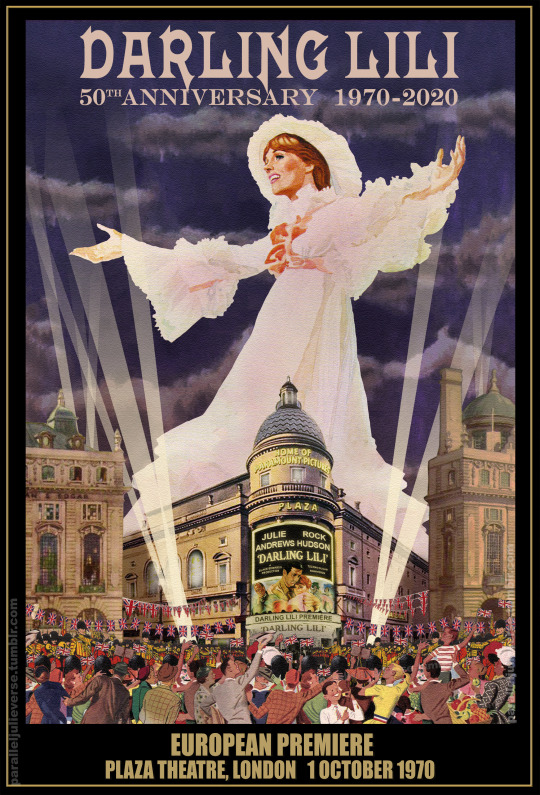
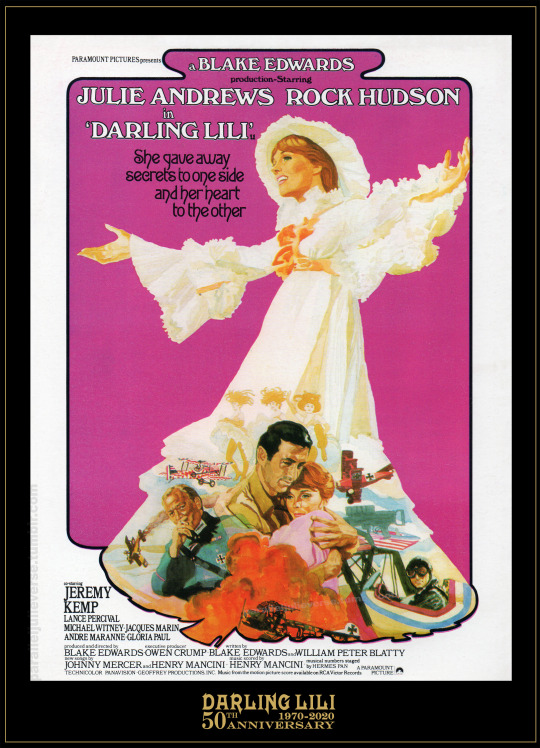
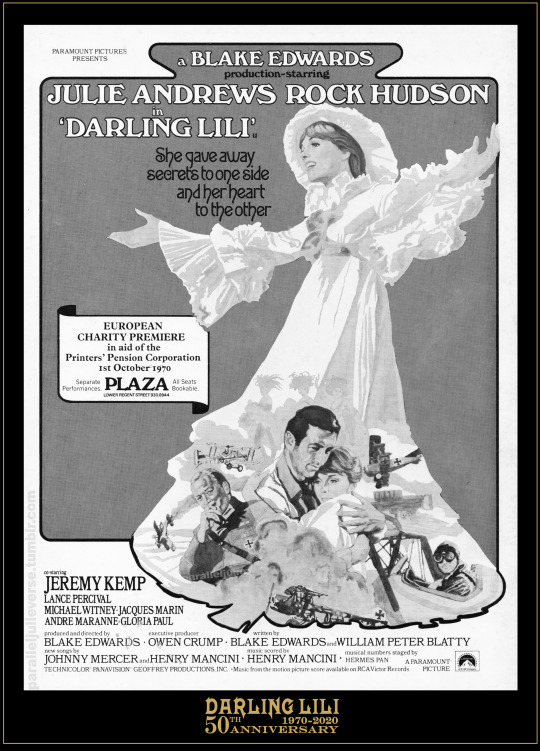
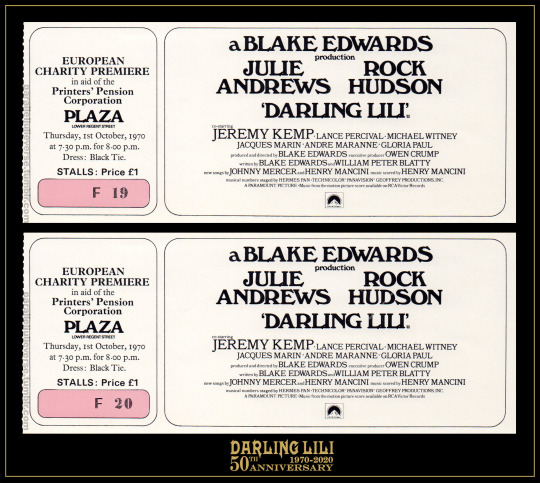
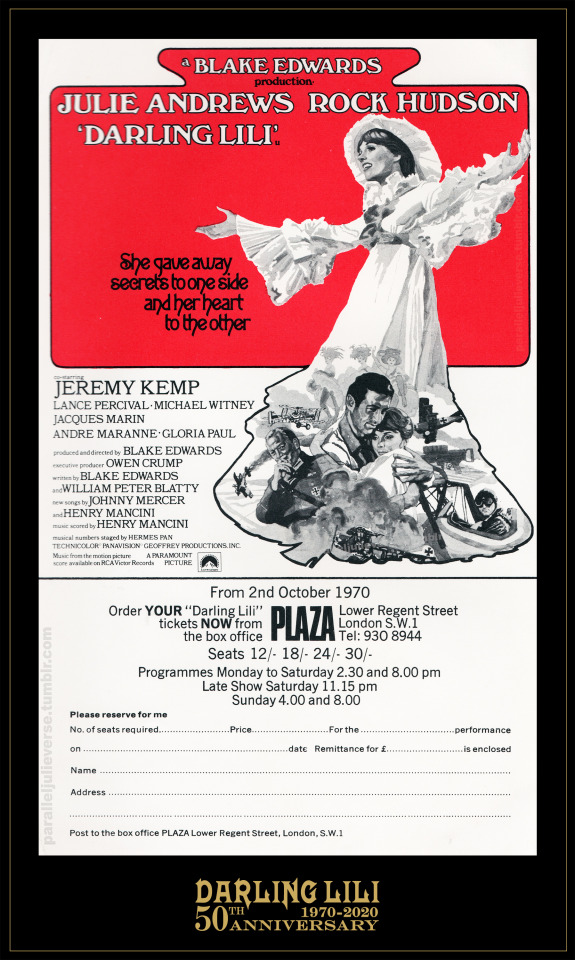
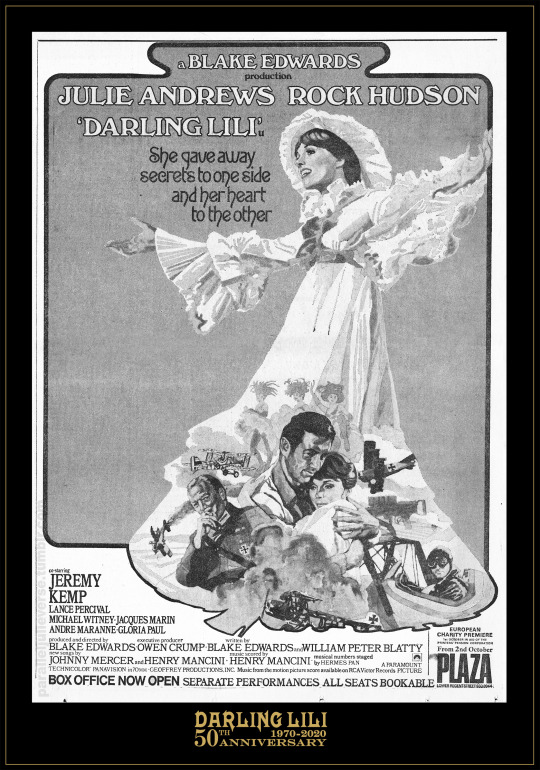
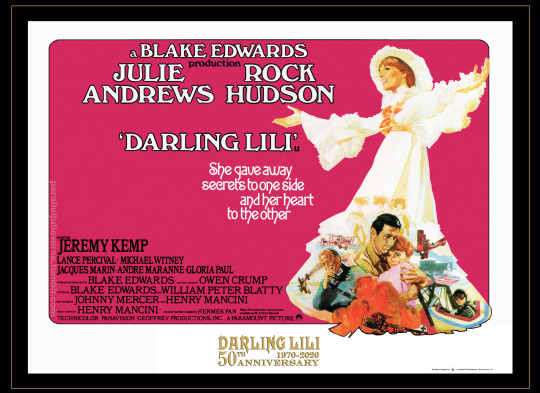
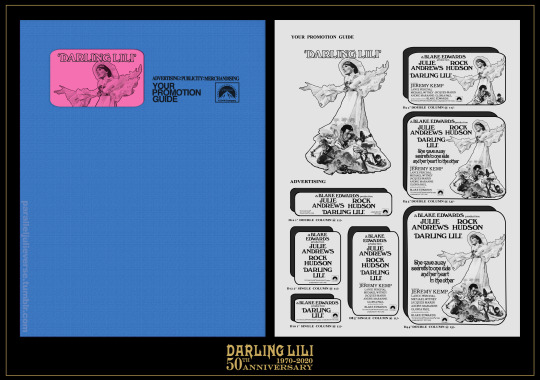
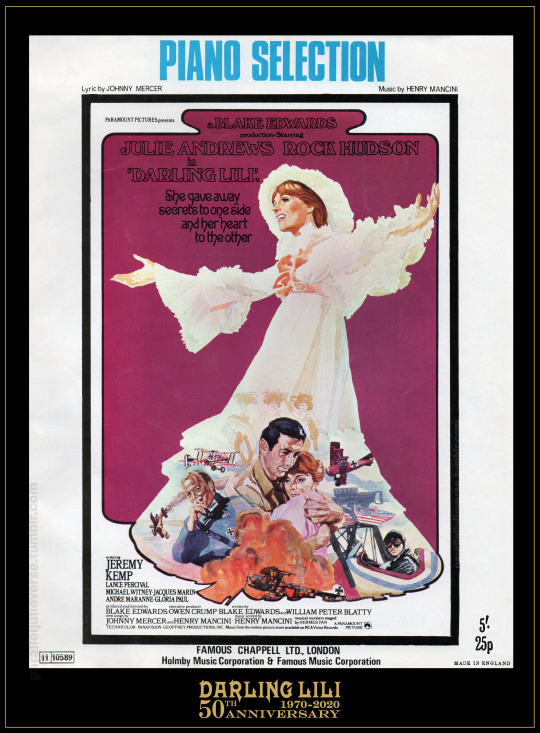
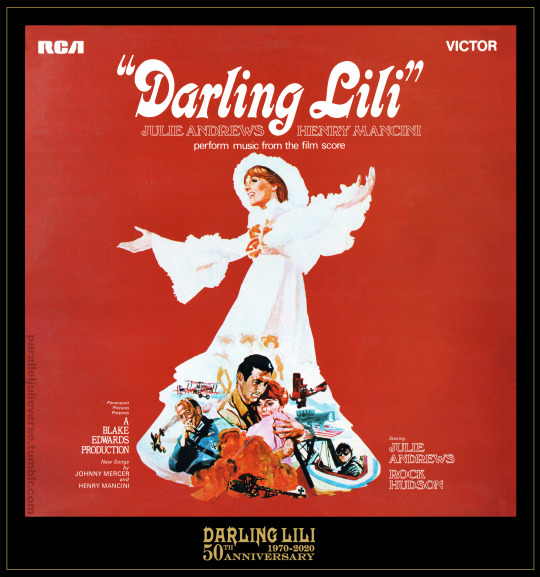
LILI IN LONDON: Darling Lili Makes Her European Bow
Fifty years ago this week, Darling Lili had its official European Premiere at the Plaza Cinema in London on 1 October, 1970. It wasn’t the film’s first international release -- that honour fell to Japan, where Darling Lili opened at the Cinerama Theatre Tokyo on 4 July, barely two weeks after the film’s US opening. However, the London premiere was a significant occasion in the film’s wider global rollout. It was, after all, Julie Andrews’ hometown and there was considerable hope local audiences would give the film a warmer reception than had been the case in North America.
Accordingly, the UK branch of Paramount Pictures afforded Darling Lili a high profile release. They exhibited the film as a full roadshow attraction, complete with widescreen 70mm print, overture and exit music, and a 24-page souvenir programme (Klar 1970). In keeping with the era’s norms of variegated international film marketing, completely new promotional artwork was commissioned for the UK release. Featuring a central image of Julie/Lili bursting into song with her arms outstretched -- a clear nod to The Sound of Music -- with a cloudburst of narrative scenes from the film fanning across the bottom of her billowing skirt, it was an arresting design that served as a ready-made marketing logo for the campaign that could be emblazoned across the full range of advertising and merchandising (Paramount 1970).
The gala premiere took place on Thursday, 1 October -- Julie’s 35th birthday, incidentally — at the Plaza Cinema in Lower Regent Street, just off Piccadilly Circus. Popularly dubbed the “Home of Paramount Pictures”, the Plaza had long been the London venue of choice for the studio’s biggest film premieres (Eyles, 26-28). Though not an official Royal Performance, the European Premiere of Darling Lili was a major society charity event with proceeds going to the Printer’s Pension Corporation, one of the oldest royally-sponsored occupational charities in the UK. Tickets were available from £1 to £5 in the stalls and £10 to £20 in the Circle with the event raising over £6000 for the charity (”Darling Lili Aids”, 12).
Official patrons of the Printer’s Pension Corporation, Lord and Lady Hartwell presided over the evening, welcoming a line of society notables and assorted local celebrities including Sue Lloyd, Judy Geeson, Clodagh Rogers and Julie Ege (“Darling Lili Has”, 32). Neither Julie nor Blake was able to make the premiere, though Julie’s parents were in attendance as honorary guests. Representing the cast, Lance Percival, who plays the comic support role of T.C. Carstairs in the film, “arrived at the Plaza in a vintage white Rolls Royce driven by a female chauffeur” (ibid.). Press reports noted that the “premiere drew large numbers of films fans to the theatre” and “the capacity audience...repeatedly applauded during the presentation of the film” (ibid.)
Following the premiere, Darling Lili opened the next day on 2 October to the general public. In a way that paralleled the experience at New York’s Radio City Music Hall, the decision to stage the film as a special event prestige picture worked well. Lili ran in roadshow release at the Plaza for over three months till 6 January 1971. It then continued to play in general release at various venues throughout London such as the ABC Cinema-Edgeware Rd well into late-1971.
Critical responses to Darling Lili in the London press ran the gamut. The film garnered several positive notices. Patrick Gibbs of the Daily Telegraph rated it “a very amiable and romantic comedy-thriller” (P14). The film “offers many pleasures,” declared the Daily Mail, with “Miss Andrews singing, dancing, delighting...with some very pretty songs...and amusing performances” (Cable, 9). The critic for the Evening Post opined:
“It is fashionable to sneer at Julie Andrews’ films as being sickly-sweet and 20 years out of date--but I can only say I enjoyed this one...Darling Lili is an enjoyable, emotional, light-hearted love story with a strong comedy element” (Watson, 7).
Other reviewers were less enthusiastic. The critic for the Daily Mirror was unsure “what kind of film Darling Lili was supposed to be”:
“Taken as a spy send-up, it’s harmless enough and drags only occasionally, but the comedy doesn’t always blend with the drama. The ending...is a cloyingly sentimental cop-out and a shade nauseating” (Richards, 19).
More than a few UK commentators baulked at the film’s irreverent treatment of World War 1--perhaps unsurprisingly given the enormous significance of the “Great War” to British history and national mythology. The critic for The Tablet, for example, called the film “a monstrous betrayal of the period.” Its “trivialisation of the issues is outrageous...I have no doubt it will be popular, but it shouldn’t be.” Still, he conceded, the film’s “photography...is very pretty and Miss Andrews’s voice is as pure as ever” (Burke, 959).
Critical concessions to “our Julie” were a notable feature of many London reviews. The all-important Times review declared:
“I wish I could like Darling Lili more. I love musicals and remain unrepentantly devoted to Julie Andrews, but this lavish new vehicle for her talents is the most upsetting sort of misfire--the sort which could so easily have been put right, with a little more thought (or a little less worry), a little more confidence in hitting the right tone and sticking to it...a disappointing waste of all the talent and money so evidently lavished on it” (Taylor, 13)
It was a sentiment echoed in The Illustrated London News:
“Miss Andrews sings well, acts decently, and even does a strip number that reveals a new side to her talent as well as a gorgeous, long-concealed, pair of legs. But, alas, not even she can save this ponderous film with its strange blend of old-and-new songs, its heavyweight prankishness, and its inordinate length” (Billington, 31).
Or again the review in The People:
“Julie has charm, grace, plus a good singing voice and Henry Mancini’s music is haunting. But the character she portrays...is hardly endearing. The story...is improbable too, even for a musical. But there are some smashing flying sequences and I like Julie’s style--so I wish it well” (Nunn, 7).
While Darling Lili opened with a splash and did decent enough business in London, it faced very different prospects elsewhere in the UK where the film became something of an inadvertent hostage in an ongoing industrial dispute. At issue was an attempt by US distributors to loosen the stranglehold and perceived old-fashioned exhibition practices of the two big regional UK chains: ABC and Odeon (“Elvin Raps”, 196; “Compromise Ends”, 24). Unable to agree on new terms, the distributors withheld several big features, including Lili, from release to these chains. As a result, Lili’s broader UK rollout was held up for months and, in some cases, years. The film didn’t get a Midlands release, for example, till April 1971 when it opened for a fixed season at the Regal Cinema in Leamington, “an independent theatre whose booking agents were able to come to terms with the distributors” (“Regal Breaks,” 2). The film then popped up intermittently at other independent theatres across the UK: Margate in September, Liverpool in October, and Belfast in January 1972.
Many major provincial markets missed out on the film completely. In a disgruntled letter to the local newspaper in early-1972, one Birmingham fan wondered if “there is a particular antipathy to musicals in our city. We have yet to see Darling Lili (Julie Andrews) and On a Clear Day You Can See Forever (Barbra Streisand), both of which have been shown in London” (Krober, 6). In a similar vein, a Reading filmgoer complained that his local ABC cinema was screening endless reissues while many new films “have yet to play in Reading..that are certainly worth a showing” such as “Julie Andrews and Rock Hudson in Darling Lili” (Suter, 10).
The UK distribution dispute was eventually resolved and Darling Lili managed to make its way out to a broader range of provincial centres including Birmingham, where it opened at the Odeon in April 1973. But by this stage the film was hardly new and whatever marketing impetus was there from the London campaign had well and truly evaporated. It was an unfortunate fizzling out for what could have otherwise been an effective national release for the film. Still, UK filmgoers who missed Darling Lili in theatres didn’t have to wait too long to catch it on the small screen. It made its British television debut as the ‘Film of the Week’ on BBC-1 on 2 April 1976 (“Film of the Week”, 22).
Sources:
Billington, Michael. “Cinema: An Ode to Lost Innocence.” The Illustrated London News. 3 October 1970: 31.
Burke, J.A.V. “Darling Lili.” The Tablet. 3 October 1970: 959.
Cable, Michael. “The Sweet English Rose is Among the Guns.” Daily Mail. 30 September 1970: 9.
“Compromise Ends US Majors’ Fight Vs. UK Circuits Over Sunday Rentals.” Variety, 13 October 1971: 24.
“‘Darling Lili’ Aids Printers’ Charity.” The Daily Telegraph. 2 October 1970: 12.
“‘Darling Lili’ Has Glittering London Bow.” The Calgary-Herald. 10 October 1970: 32.
“Elvin Raps ‘Oldfashioned Methods’ of UK Pic Biz, Hits Chains’ Bookings.” Variety. 29 April 1970: 196.
Eyles, Allen. London's West End Cinemas. Swindon : English Heritage, 2014.
“Film of the Week: ‘Darling Lili’.” Radio Times, 1 April 1976: 22.
Gibbs, Patrick. “Films: Spying With a Song.” Daily Telegraph. 2 October 1970: P14.
Harmsworth, Madeleine. “New Film.” Sunday Mirror. 4 October 1970: 29.
Klar, Arthur. Darling Lili [Souvenir Book], London: National Publishers, Inc, 1970.
Krober, Kenneth S. “Letters to the Editor: Antipathy To Musicals.” Birmingham Daily Post, 7 February 1972: 6.
Mallett, Richard. “Cinema.” Punch. No. 6787, 7 October 1970: 510.
Nunn, Ray. “But Will Lili Keep ‘Em Singing?” The People. 4 October 1970: 7.
Paramount Pictures (UK). Your Promotion Guide: Darling Lili [Advertising Campaign Manual], Chiswick, 1970.
“Picture.” Daily Telegraph. 2 October 1970: P17.
“Regal Breaks Stranglehold.” Birmingham Daily Post. 27 April 1971: 2.
Richards, Dick. “I Spy a Send-Up.” Daily Mirror. 1 October 1970: 19.
Suter, Les. “Letters to the Editor: Old Films.” Reading Evening Post. 15 June 1972: 10.
Taylor, John Russell. “Purple Passages in Paris.” The Times. 2 October 1970: 13.
Watson, Albert. “At the Cinema: Yes, I Enjoyed Julie Andrews!” Evening Post. 10 October 1970: 7.
Copyright © Brett Farmer 2020
#Darling Lili#julie andrews#european premiere#film premiere#london#plaza theatre#paramount#blake edwards#rock hudson#film history#classic film#old hollywood
11 notes
·
View notes
Link
Explosive leaked documents have revealed that officials within the Labour Party worked against Jeremy Corbyn in a bid to lose the 2017 general election.
A dossier drawn up by the party containing a cache of leaked WhatsApp messages and emails shows senior staff from the party’s right wing actively worked to sabotage the campaign in the hope that a bad result would trigger a leadership contest.
They became despondent as Labour climbed in the polls during the election campaign despite their efforts, with Corbyn dramatically slashing the Conservative’s majority in parliament.

AntiSemitism in the party
The unreleased report was drawn up in the last days of Mr Corbyn’s leadership and concerns the conduct of certain officials, including some who were investigating cases of antisemitism in the party.
It claims that “an abnormal intensity of factional opposition to the party leader” had “inhibited the proper functioning of the Labour Party bureaucracy” and contributed to “a litany of mistakes” in dealing with antisemitism, which it admits was a serious problem in the party.
The Campaign Against Antisemitism has rubbished the findings, saying the dossier is a “desperate last-ditch attempt to deflect and discredit allegations” and amounted to “an attempt to imagine a vast anti-Corbyn conspiracy”.
But incumbent leader Keir Starmer is likely to now face calls to investigate the behaviour detailed in the report, including “the possible misuse of funds” by officials.
Anti-Corbyn tactics
Among the anti-Corbyn tactics evidenced in the report it was found that resources were channelled to candidates associated with the right wing of the party.
Some staff members were also accused of “coming into the office and doing nothing for a few months” during the election campaign.
The report says hostile staff created a chat so they could pretend to work while actually speaking to each other, with one participant stating that “tap tap tapping away will make us look v busy”.
Election night
An election night chat log shows that 45 minutes after the exit poll revealed that Labour had overturned the Conservative majority, one senior official said the result was the “opposite to what I had been working towards for the last couple of years”, describing themselves and their allies as “silent and grey faced” and in need of counselling.
Another said: “We have to be upbeat and not show it”, while a third told the group that “everyone needs to smile”, describing the result as “awful”.
Another very senior party official said it was going to be “a long night”.
Bullying
The report also details large volumes of abusive discussion by senior officials about colleagues and activists from the party’s left wing.
In one exchange a senior official said a young activist had “mental health issues”, to which another official chimed in: “I hope [name of activist redacted] dies in a fire”.
A third said: “That’s a very bad wish [name redacted]. But if he does I wouldn’t piss on him to put him out.” The second official then adds: “Wish there was a petrol can emoji”.
One exchange shows a senior official described another from the left of the party as “pube head”. In another months later they called her a “smelly cow” and comment that she “had the exact same clothes on yesterday”.
Leadership election
In 2017 senior officials in the party discussed making preparations for another leadership election, hoping that one might be triggered by the party losing the Copeland and Stoke-on-trent by-elections.
Chat logs show one said “if we lose these elections we could have another leadership election. We should set up at some stage a discrete WG [working group] to go over rules, timetable scenarios and staff servicing the process. Just so we’re prepared”.
A very senior official approved the process, dubbing it “Operation Cupcake” and suggesting that Tom Watson could be interim leader. The leadership election would have been the party’s third in three years.
---
Written by Jack Peat
Jack is a business and economics journalist and the founder of The London Economic (TLE).He has contributed articles to The Sunday Telegraph, BBC News and writes for The Big Issue on a weekly basis.Jack read History at the University of Wales, Bangor and has a Masters in Journalism from the University of Newcastle-upon-Tyne.
source: https://www.thelondoneconomic.com/politics/leaked-dossier-shows-labour-party-officials-worked-against-corbyn-in-a-bid-to-lose-2017-general-election/13/04/
1 note
·
View note